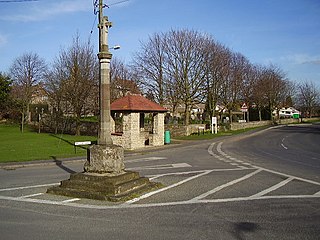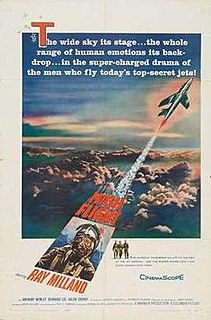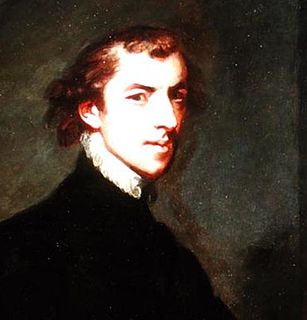Related Research Articles
Richard Mant was an English churchman who became a bishop in Ireland. He was a prolific writer, his major work being a History of the Church of Ireland.

Cranwell is a village in the North Kesteven district of Lincolnshire, England. It is part of the civil parish of Cranwell and Byard's Leap and is situated approximately 3 miles (5 km) north-west from Sleaford and 14 miles (23 km) south-east from the city and county town of Lincoln. The principal through road, the B1429 between the A15 to the east and the A17 to the west, joins the village to RAF Cranwell. The appropriate civil parish is called Cranwell, Brauncewell and Byard's Leap with a population of 2,827 at the 2011 census.
George Steevens was an English Shakespearean commentator.

Royal Air Force Cranwell or more simply RAF Cranwell is a Royal Air Force station in Lincolnshire, England, close to the village of Cranwell, near Sleaford. Among other functions, it is home to the Royal Air Force College (RAFC), which trains the RAF's new officers and Aircrew. The motto, Altium Altrix, meaning "Nurture the highest" appears above the main doors of the Officers Mess. RAF Cranwell is currently commanded by Group Captain Joanne Campbell.
Nationality words link to articles with information on the nation's poetry or literature.
Richard Polwhele was a Cornish clergyman, poet and historian of Cornwall and Devon.

Henry Cecil, 1st Marquess of Exeter, known as Henry Cecil from 1754 to 1793 and as The Earl of Exeter from 1793 to 1801, was a British politician who sat in the House of Commons between 1774 and 1790 and succeeded to the peerage as Earl of Exeter in 1793.

The Venerable Francis Wrangham was the Archdeacon of the East Riding. He was a noted author, translator, book collector and abolitionist.

Charles Richard "Dick" Cranwell is an American lawyer and Democratic Party politician. He was a member of the Virginia House of Delegates 1972–2001, and was its Democratic floor leader 1991–2001. From 2005 to 2010, he was chairman of the Democratic Party of Virginia.

The Royal Air Force College (RAFC) is the Royal Air Force training and education academy which provides initial training to all RAF personnel who are preparing to be commissioned officers. The College also provides initial training to aircrew cadets and is responsible for all RAF recruiting along with officer and aircrew selection. Originally established as a naval aviation training centre during World War I, the College was established as the world's first air academy in 1919. During World War II, the College was closed and its facilities were used as a flying training school. Reopening after the War, the College absorbed the Royal Air Force Technical College in 1966.

High Flight is a 1957, CinemaScope, American, cold war children’s film in Technicolor, directed by John Gilling and featuring Ray Milland, Bernard Lee and Leslie Phillips. High Flight was filmed with the co-operation of the Royal Air Force (RAF). The title of the film was derived from the poem of the same title by Pilot Officer John Gillespie Magee, Jr., an American aviator who flew for the Royal Canadian Air Force (RCAF) and lost his life in 1941 over RAF Cranwell, where much of the film was shot.
Nicholas Comper was an English aviator and aircraft designer, whose most notable success was the 1930s Comper Swift monoplane racer.

John Thomas was an English churchman, Bishop of Rochester from 1774.
Samuel Taylor Coleridge was born on 21 October 1772. The youngest of 14 children, he was educated after his father's death and excelled in classics. He attended Christ's Hospital and Jesus College. While attending college, he befriended two other Romanticists, Charles Lamb and Robert Southey, the latter causing him to eventually drop out of college and pursue both poetic and political ambitions.
To Fortune was composed by Samuel Taylor Coleridge in 1793 when he played the lottery in the hope of getting out of debt. The poem was the first work of his to be printed in a major publication.

Rev. George Huddesford (1749–1809) was a painter and a satirical poet in Oxford. Huddesford published a number of works. His first work was described by Fanny Burney as a "vile poem" as it revealed that she had written the novel, Evelina.
William Preston was an Irish poet, playwright and essayist.
John Wallis was an English cleric, antiquarian, naturalist and county historian.
William J. Flynn was an American college athletics administrator. He was the athletic director at Boston College from 1957 to 1990. He began his association with Boston College in 1935 as a student athlete. He was also a mathematics professor and assistant football coach at the school.

The Glenriddell Manuscripts is an extensive collection written in holograph by Robert Burns and an amanuensis of his letters, poems and a few songs in two volumes produced for his then friend Captain Robert Riddell, Laird of what is now Friars Carse in the Nith Valley, Dumfries and Galloway. The two volumes of the manuscript were handsomely bound in calf leather. The first volume of poems and songs was completed by April 1791 and was presented to Robert Riddell, however their friendship ceased due to the unfortunate 'The Rape of the Sabine Women' incident and Robert Riddell died shortly after before any reconciliation could take place. The first volume is partly in Burns's hand with one main amanuensis contributing much of the text in a far neater hand than the author himself and a possible third person contributing to the text. The second volume is entirely in Burns's hand.
References
 This article incorporates text from a publication now in the public domain : Stephen, Leslie, ed. (1888). "Cranwell, John". Dictionary of National Biography . Vol. 13. London: Smith, Elder & Co.
This article incorporates text from a publication now in the public domain : Stephen, Leslie, ed. (1888). "Cranwell, John". Dictionary of National Biography . Vol. 13. London: Smith, Elder & Co.